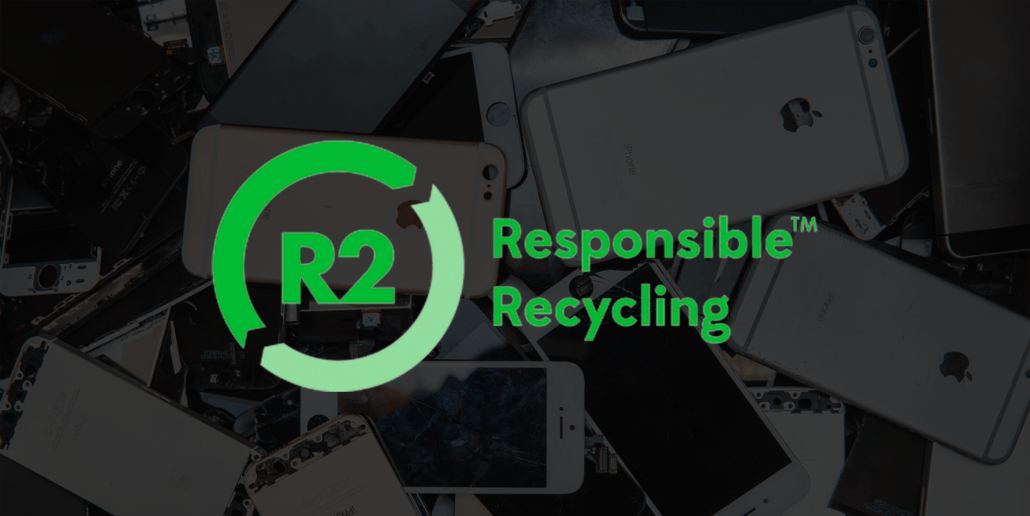Why Many Carriers Require R2 Certification

Anyone operating in the used mobile phone ecosystem has heard of R2 certification (responsible recycling certification). R2 certification is a company-wide certification that follows the industry-recognized R2 standard seat by the R2 Technical Advisory Committee (TAC). It deals with the responsible and ethical handling of used electronics. Companies that meet compliance requirements use best practices for disposing of e-waste in ways that protect customer data and the environment.
R2 certification covers end-of-life electronics, parts, components, and e-waste. R2 certification is considered by many to be the gold standard. When it comes to upholding and demonstrating the ability to properly handle and manage e-waste. Many large corporations and enterprises selling or disposing of used electronics. Will not do business with companies that are not R2 certified. Most mobile carriers require buyers of their used mobile devices to have R2 certification.
What Areas Are Covered by R2 Certification?
R2 certification is a dual-pronged certification that deals with two very important elements of handling e-waste: data security and environmental sustainability. The strength of R2 certification is how it creates a “clean slate” from both a data and environmental perspective.
How Wholesalers with R2 Certification Reduce Liability for Mobile Carriers
Wholesalers with R2 certification enable mobile carriers to monetize used devices while preventing data exposure for customers that have traded in devices. The R2-mandated methods for handling post-usage data are designed to prevent customer and user data from being accessed and used. These guidelines are essential to preventing liability from the mishandling of data. Any enterprise that is caught mishandling data in a way that leaves its customers vulnerable could face very serious legal, financial, and reputation-related consequences.
Another benefit of selling to wholesalers with R2 certification is that such wholesalers have committed to e-waste disposal practices that protect the environment. When carriers sell to wholesalers with R2 certification. They minimize the risk of liability issues related to the mishandling of materials or the generation of pollutants.
The Data Security Imperative
Recent examples of expensive data breaches have left enterprises with little choice but to take better measures to protect devices. The Equifax data breach that exposed information belonging to 143 million people and cost nearly $1.4 billion was a recent example. The National Association for Information Destruction (NAID) found that 40% of personal electronic devices still contained personally identifiable information (PII) after disposal. That same study found that personal and corporate financial data, contact information, passwords, and tax records were still accessible on 13% of the examined mobile phones. IBM’s 2019 Data Breach Report shows that the average cost of a data breach for an American company is $8.19 million. With the average data breach involving 25,575 records. IBM also found that around 25% of American data breaches can be attributed to negligence, including people’s failure to properly erase data from old devices. This is troubling, but wholesalers with R2 certification help to reverse improper practices.
R2 compliance fits with the agenda to render discarded devices “diffused,” as it requires the destruction of all data embedded within used electronics. Certification offers a “clean-slate” strategy that won’t allow people to reanimate data on discarded devices. This is important because many enterprises are reluctant to “recycle” devices out of fear of possible data breaches. R2 certification removes that obstacle and allows enterprises a way to clear out e-waste for the sake of reducing liability, making room, or recovering costs.
The Environmental Side of R2
R2 certification also places a deep focus on the sustainable disposal of electronic waste generated when items become obsolete. R2 certification’s environmental approach is primarily about keeping materials out of landfills. The Environmental Protection Agency (EPA) strongly encourages all electronics recyclers to get this certification.
Approved and vetted R2 standards assess factors like environmental impact and, the health of workers. While reselling or disposing of electronics. Best practices don’t end when materials leave the hands of a certified enterprise. R2-certification should be thought of as a full-cycle tool for accountability, as it requires full visibility into downstream recycling processes.
The Bottom Line on R2
R2 certification is either preferred or required across the industry because of the need for strong and complete data security. Certified handlers know how to minimize risks related to personal information being captured from discarded or sold devices. Environmental concerns are also contributing factors, as major carriers don’t want to associate with buyers that improperly dispose of electronics. R2-certificate effectively reduces environmental damage and health consequences that arise from improper recycling practices.
Why R2 Is Important to Us
We Sell Cellular‘s facility in New York is R2 certified. We value sustainable practices that can prevent environmental degredation, and we take data sanitation seriously. Our adherence to R2 policies ensures that each device offers a “clean slate” that makes a previous user’s data unrecoverable.
Furthermore, our company mission of “Improving Wealth and Well-Being by Unlocking Value from Waste” is in line with R2’s philosophy of increasing sustainability. The resale of secondhand phones in effect finds a second home for used mobile devices. Thus reducing overall waste in the ecosystem..
Learn more about our company’s grading scale, one of our other check marks for ensuring quality inventory.








